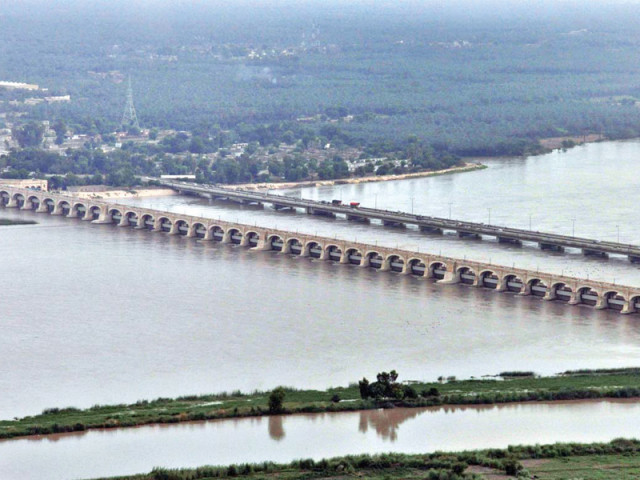Sindh lawmakers blame Punjab for ‘stealing’ water
Sea water has eroded 90 villages along the coast, claims PPP minister

PHOTO: FILE
The discussion was instigated when Pakistan Peoples Party (PPP) MPA Khairunisa Mughal moved a resolution and government took the opposition parties’ consensus to debate on the issue for two hours. “The sea water has washed away as many as 90 villages [along the coastal belt of Sindh],” said Mughal. She suggested the government build a coastal highway from Karachi to Badin to protect settlements from sea intrusion.
Regulator cuts water share of Punjab, Sindh
“We are quite conscious of the difficulties being faced by the people of Sindh, especially in lower parts, and will not let Punjab further exploit water accords,” said PPP minister Syed Sardar Shah. “Sindh is not orphaned land. We will resist if Punjab did not revisit its policies on the water issue.”
History lesson
“Unfortunately, Punjab has been violating the water accord since 1945,” said health minister Dr Sikandar Mandhro, giving a briefing on the history of water accords. “Due to lack of river water, the sea has eroded thousands of acres in Badin and Thatta districts but the federal government and Punjab bureaucracy has turned a blind eye towards it.”
Around 122,000 acres of fertile land has so far been eroded by the sea and every day 80 acres are lost to the Arabian Sea, he claimed. “With plenty of sweet river water, the sea level will not rise, but Punjab has controlled our waters,” he said.
Referring to the 1991 water accord, he said it was the Pakistan Muslim League-Nawaz government led by Prime Minister Nawaz Sharif that finally succeeded in achieving consensus among the province and ensured that Sindh will get 10 million acre feet (MAF) below Kotri downstream but all in vain.
“During the 1961 water accord, it was decided that Punjab will not carve any canal out of River Indus but this was never implemented and Punjab built many canals diverting Sindh’s water share to irrigate agriculture land,” said Syed Sardar Ahmed, the parliamentary leader of Muttahida Qaumi Movement.
He pointed out that the water distribution issue existed even during the British period. The Anderson Committee was established in 1935, and Rau and Sindh-Punjab agreements were also signed to resolve the water dispute. All of these failed to yield any positive results.
Balochistan accuses Sindh of stealing its water
Blame game
Pakistan Muslim League Functional’s (PML-F) Nusrat Seher Abbasi mentioned the speech of PPP founder Zulfikar Ali Bhutto in the UN Security Council, where he tore the agenda copy over the issue of then East Pakistan. “PPP had also been in power in the central government but did nothing on this issue,” she pointed out. “Now they are making hue and cry inside this session.”
She shared some facts. “There are predictions that Thatta and Sujawal will sink by 2050. I want to know what precautionary measures you have taken to stop the sea from gushing towards settlements?”
Dam you, Kalabagh
PPP minister Manzoor Wassan held the successive governments responsible for building dams to control the flow of water into Sindh. “It was during Musharraf’s tenure when the campaign started in favour of Kalabagh Dam,” he said. “Some members sitting in this house supported the idea. Only the PPP was protesting.”
His comments irked the MQM and PML-F members but deputy speaker Shehla Raza stepped in before the situation turned worse.
“If the PPP is against Kalabagh Dam, then why did it allocate funds for it?” an MPA shouted. Chief Minister Murad Ali Shah clarified that the PPP has never ever earmarked the budget for this controversial project.
Published in The Express Tribune, January 28th, 2017.



















COMMENTS
Comments are moderated and generally will be posted if they are on-topic and not abusive.
For more information, please see our Comments FAQ